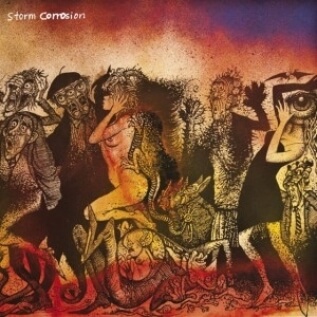” [This is]the final part in the odd trilogy of records completed by [Opeth’s] ‘Heritage’ and [Steven Wilson‘s brand new solo album] ‘Grace for Drowning’”, states Steven Wilson about ‘Storm Corrosion’.
And it is because of such a comparison that the first full-blooded collaboration between prog gods Wilson and Mikael Åkerfeldt was so anxiously awaited by both Opeth and Porcupine Tree fans alike… and that’s likely the reason why most of them were left disappointed at the result.
The Wilson description is actually quite accurate. Those three aforementioned albums do share a bond between them although it is so esoteric (meaning just hidden) that it requires one to plunge deep before seeing it clearly. The link between those three quite different albums is atmosphere – the somber, ghostly and melancholic atmosphere, so characteristic of the works of both Wilson and Åkerfeldt.
‘Storm Corrosion’ is quiet. Unsettlingly quiet album fit for headphones and long night listens with a glass or two of fine single-malts whiskey. The dominating feel is a definite cinematic one and on certain occasions these prolonged (merely six) pieces remind one strongly of the Cold Meat Industry ambient sound. Vocals are used sparsely, mainly done by Wilson with the exception of opener ‘Drag Ropes’ where one hears the distinct voice of Mikael. It’s hopelessly hard to pinpoint a particular style here – ‘Storm Corrosion’ encompasses those quiet, meditative moements from King Crimson’s ‘In the Court of the Crimson King’ and ‘In the Wake of Poseidon’, employing the classical reach of minimalists Steve Reich and Philip Glass as well.
Orchestral moments and electric guitar solos are just welcome additions to the overall atmosphere and never accents. This is progressive without being the overtly complex progressive rock that most people associate the term with. Wilson and Åkerfeldt achieve a grand mastery of their own type of slow, drowsy and cinematic ambient rock.
Album center-pieces are opener ‘Drag Ropes’ (be sure to check the superb animated video) and the closer ‘Ljudet Innan’ but as you can very well conclude from everything said above, this is an album best enjoyed as a whole.

